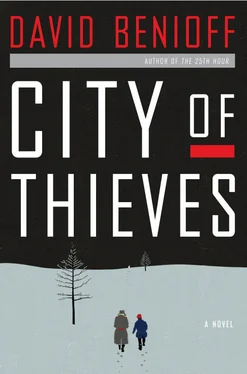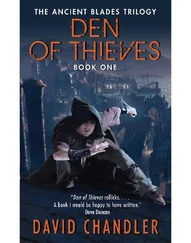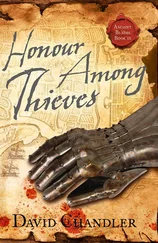“They’re mines,” said Kolya. “They teach them to find food underneath a tank’s armor, and then they starve them, and when the Panzers come they let them loose. Boom.”
Except none of the dogs had gone boom. The Germans clearly knew all about it; they’d warned their gunners and their gunners were good shots. Dead dogs littered the field, but there were no tank carcasses, no upended armored cars, no explosions at all. It was another ingenious Russian ploy that had failed completely, as all of the Russian ploys had failed, and I pictured the hungry dogs sprinting toward the Panzers, their paws kicking up fantails of snow, their eyes bright and happy as they raced for their first meal in weeks.
“Give me your knife,” said Kolya.
“Be careful.”
“Give it to me.”
I pulled the German dagger from its sheath and handed it to him. The sheepdog kept trying to drag his gutted self toward the woods, but he was losing strength in his front legs. He finally quit when he saw Kolya approaching, as if he had decided that this was far enough. He lay in the blood-wet snow, staring up at Kolya with weary brown eyes. The wood post stuck straight up from the box on his back like the mast of a sailboat. It seemed a flimsy thing, no thicker than a drumstick.
“You’re my good boy,” said Kolya, kneeling beside the sheepdog, holding the back of the dog’s head steady with his left hand. “You’re my good boy.”
Kolya cut the dog’s throat with one quick motion. The dog shuddered, the blood pouring from him, steaming in the cold air. Kolya lowered the dog’s head gently to the ground, where he continued to twitch for a few seconds, pawing at nothing, like a dreaming puppy, and then he was dead.
We were silent for a moment, giving our respect to the fallen dog. Kolya wiped both sides of the bloody blade on the snow, dried it on the sleeve of his overcoat, and handed it back to me.
“We just lost forty minutes. Walk fast.”
We marched at double time through the birch forest, the railroad tracks to our left, the sun tumbling fast from the sky. Kolya hadn’t spoken since the field of dead dogs. I could tell he was worried about the time; he had miscalculated our speed, how fast we could walk across snow-covered terrain, and our detour had ruined any chances of making Mga by nightfall. The cold was a greater danger than the Germans now and the temperature was already dropping fast. Without shelter we would die.
We hadn’t seen a human being since saying farewell to the Tartar sergeant and we kept our distance from the abandoned railway stations at Koloniya Yanino and Dubrovka. Even from two hundred meters away we could see the toppled statue of Lenin outside the Dubrovka station, the black graffiti spray painted on the concrete wall: STALIN IST TOT! RUSSLAND IST TOT! SIE SIND TOT!
At three in the afternoon the sun dipped below the western hills and the brooding gray clouds above us flared orange. I heard the whine of airplane engines and looked up to see four Messerschmitts racing toward Leningrad, so high above us they seemed harmless as fruit flies. I wondered what buildings they would flatten, or if they would be shot down by our boys on the ground, or our pilots in the air. It seemed wonderfully abstract to me, somebody else’s war. Wherever they dropped their bombs, it wouldn’t be on me. When I realized that thought was my own, I felt a surge of guilt. What a selfish shit I had become.
We were walking past Berezovka, a name I’d first heard in September when the Red Army and the Wehrmacht clashed outside the village. According to the newspapers, our boys fought with great valor and tactical brilliance, outfoxing the German commanders and frustrating Hitler himself, who followed each development from his war room in Berlin. But everyone in Leningrad knew how to read a newspaper article. The Russian forces were always “calm and determined,” the Germans were always “stunned by the fury of our resistance”—these phrases were mandatory. The key information came near the bottom of each article, tucked away inside a closing paragraph. If our men “withdrew to reserve our fighting strength,” we had lost the battle; if the troops “gladly sacrificed themselves to repel the enemy invaders,” we had been massacred.
Berezovka was a massacre. According to the papers, the village was famous for its church, built on the direct order of Peter himself, and a bridge where Pushkin challenged a rival to a duel. These landmarks were gone. Berezovka was gone. A few fire-blackened walls still stood above the snow; if not for that, there would be no sign that the village had ever existed.
“They’re fools,” said Kolya, as we skirted around the hamlet’s torched remnants. I looked up at him, not sure whom he meant.
“The Germans. They think they’re so efficient, the greatest war machine ever built. But you look at history, you read the books, and the best conquerors always gave their enemies a way out. You could fight Genghis Khan and get your heads lopped off or you could submit and pay him taxes. That’s an easy choice. With the Germans, you can fight them and get killed or you can surrender and get killed. They could have turned half this country against the other half, but they don’t have subtlety; they don’t understand the Russian mind; they just burn everything.”
What Kolya said was true enough, as far as it went, but it seemed to me that the Nazis had no interest in a subtle invasion. They didn’t want to change anyone’s mind, at least no one among the inferior races. The Russians were a mongrel people, spawned by hordes of Vikings and Huns, raped by generations of Avars and Khazars, Kipchaks and Pechenegs, Mongols and Swedes, infested by Gypsies and Jews and far-roaming Turks. We were the children of a thousand lost battles and defeat was heavy in us. We no longer deserved to exist. The Germans believed in the lesson of Darwin’s mockingbirds—life must adapt or die. They had adapted to brute reality; we mixed-race drunks on the Russian steppes had not. We were doomed, and the Germans were only playing their mandated role in human evolution.
I didn’t say any of that, though. All I said was, “They gave the French a way out.”
“All the Frenchmen with balls died on the way home from Moscow in 1812. You think I’m joking? Listen, one hundred and thirty years ago they had the best army in the world. Now they’re the whores of Europe, just waiting to be fucked by whomever comes along with a hard cock. Am I wrong? So what happened to them? Borodino, Leipzig, Waterloo. Think about it. Courage got blasted out of their gene pool. Their little genius Napoleon castrated the whole country.”
“We’re losing the light.”
He glanced up at the sky and nodded. “If it comes to it, we can build a dugout and make it through till morning.”
He walked faster, accelerating our already-quick pace, and I knew that I couldn’t keep up for much longer. Last night’s soup was a delicious memory; the sergeant’s gift of ration bread had been devoured before noon. Each footstep was an effort now, as if my boots had been lined with lead.
It was already so cold I could feel it in my teeth; the cheap fillings plugging my cavities shrunk when the temperature dipped low. But I couldn’t feel my fingertips even though I wore thick wool mittens and had shoved my hands into the pockets of my overcoat. Nor could I feel the tip of my nose. What a good joke that would be—I spent most of my adolescence wishing for a smaller nose; a few more hours in the woods and I wouldn’t have a nose.
“We’re going to build a dugout? With what? You brought a shovel?”
“You still have hands, don’t you? And the knife.”
“We need to get inside somewhere.”
Читать дальше












